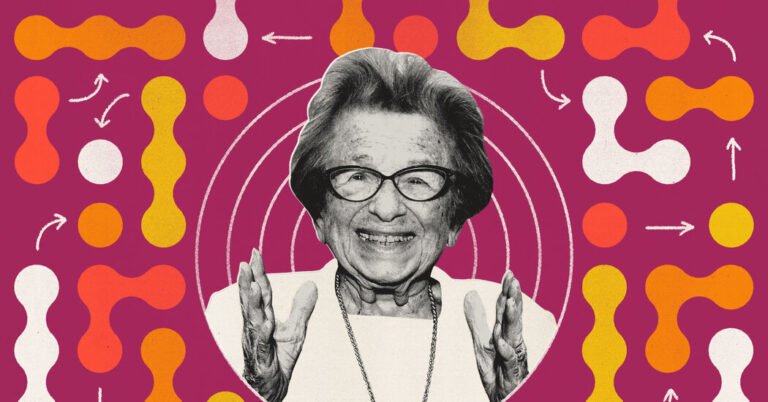
Toward the end of her life, America’s best-known sex therapist Dr. Ruth Westheimer stopped talking so much about sexual dysfunction and started talking about another topic often shrouded in shame: loneliness.
She had, she believed, the perfect credentials to take on our ongoing loneliness epidemic. A German Jewish refugee whose parents died during the Holocaust, she had been divorced twice, and then widowed. Dr. Ruth understood loneliness.
But she also believed her training as a sex therapist helped her address the humiliation that loneliness can cause.
“Nobody is excited to admit they’re having difficulty in the bedroom,” Dr. Ruth wrote in “The Joy of Connections,” her final book, which will publish on Sept. 3 — less than two months after her death at 96. “Nobody is thrilled to confess they have too few reliable friends. Shame is the thread that connects them both, and shame is what I’ve always tried to help people overcome.”
“The Joy of Connections” is, essentially, a list of 100 strategies for building stronger bonds, all shaped by Dr. Ruth’s belief that loneliness is nothing to be ashamed of, and by her intolerance for wallowing.
“You can,” she insisted, “make the decision that being lonely is no longer an option.”
“She’s all about agency,” said Allison Gilbert, one of two authors with whom Dr. Ruth wrote her new book. “She’s all about taking steps to get to where you want to go, and not waiting.”
Here are five of Dr. Ruth’s final lessons for connection.
1. Be a turtle.
Dr. Ruth’s Manhattan apartment was filled with hundreds of miniature turtles — most gifts from family or friends — that crowded her bookshelves and her coffee table, to the point where there was no room for an actual cup of coffee.
Turtles weren’t just her favorite animal; they were a favorite (if unsubtle) metaphor. To live a full and connected life, you’ve got to stick your neck out. “A turtle can’t hunt for food, bask in the sun, or find a mate if it plays it safe forever,” she wrote. “Turtles must take risks in order to live.”
2. Lose count.
As a single mother with no money for a babysitter but a strong desire to keep in touch with friends, Dr. Ruth got in the habit of throwing parties — becoming a self-described “perpetual hostess.” But rather than growing resentful that she usually had to initiate plans, she embraced hosting because it made her feel less isolated.
“I myself have been caught up in the mental arithmetic of how many times I have hosted versus been invited to places,” admitted Ms. Gilbert. “Your goal at the end of the day is not a ledger that feels more equal. Your goal at the end of the day is to be surrounded by people who you actually want to be with.”
3. Broaden your “friendcabulary.”
Many of us get hung up on the idea that the relationships with our best friends are, well, the best friendships to cultivate, but Dr. Ruth believed it was important to pursue all kinds of platonic connections. Work friends. Friends of friends. Casual friends. (Indeed, research shows weak ties can help boost well-being.)
And don’t discount anyone because of gender, age or sexual orientation, she wrote.
Debby Herbenick, a professor at the Indiana University School of Public Health, recalled how Dr. Ruth made an effort to connect with colleagues. As a new mother, she attended a work luncheon with Dr. Ruth and had her baby in tow. The world-famous therapist doted on Dr. Herbenick’s baby like an old family friend, she recalled. “After she passed, I saw other people in my field were saying, ‘Oh yeah, we did this thing together, but she was more interested in my daughter.’”
4. Make your town smaller.
When Dr. Ruth moved to New York, she recognized an immediate need to make the big city feel smaller. “I had to work exceptionally hard to introduce myself to neighbors and make meaningful connections,” she wrote. She joined community organizations. She chatted up neighbors in the elevator, occasionally seizing the opportunity to quiz them about their sex lives.
“Have you ever gone to a neighborhood block party? If next week you didn’t leave your living room, would anyone wonder where you are?” she recommended asking yourself. “If your answer to either question is ‘no,’ you must change your absentee status right now.”
5. If you’re lonely, say it out loud.
Dr. Ruth worked as a behavioral therapist for decades. She described her approach as direct, fast-moving and practical. And she believed many of her clients began to heal in practically the same breath in which they admitted to having a problem. So if you feel lonely, say it — out loud.
Take solace in the fact that while it may seem as though everyone around you is fulfilled by their relationships, most people feel lonely at some point in their lives.
“I know,” Dr. Ruth wrote, “that if we talk openly about loneliness — unapologetically and without euphemisms — those who are feeling painfully disconnected will feel less alone, too.”